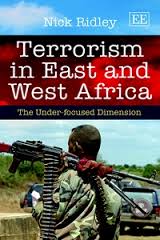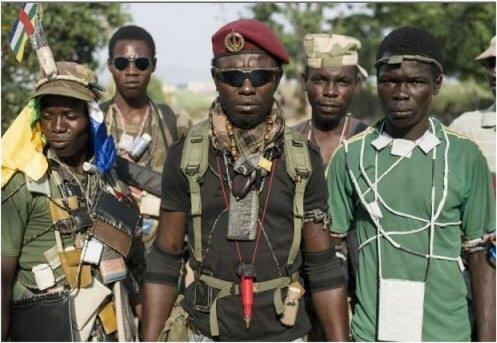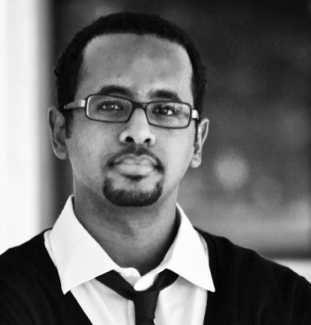Terrorism in East and West Africa: PC Plod fails to shed light on a complex subject – A Review By Keith Somerville

 Nick Ridley, Terrorism in East and West Africa: The Under-focused Dimension, Cheltenham, Glos: Edward Elgar, 2014.
Nick Ridley, Terrorism in East and West Africa: The Under-focused Dimension, Cheltenham, Glos: Edward Elgar, 2014.
As I started reading this new book on terrorism in Africa I was intrigued to know what was meant by the title’s reference to “The Under-Focused Dimension”. Having now finished and thought about the work my conclusion is that the author under-focused on many dimensions – factual accuracy, context, definitions of conflict and of terrorism in particular, and on punctuation, grammar and more generally the meaning of words.
The author is described as a Senior Lecturer on policing and security and, it seems, is a former anti-terrorism practitioner with the Metropolitan Police and Special branch. Mr Ridley seems to have carried over the stilted, often ungrammatical and context-free style of police evidence in court or interviews with the media into his writing style.
He admits he is “a non-African specialist and a tyro in African studies.” He goes on to say in his preface that “The strategic under-focusing will be shown and progressed in the book”. Forgive my obtuseness here, but how do you progress under-focusing? This really is PC Plod discovers Africa and finds out what a scary place it is.
At this point you are probably asking why I continued with the review and why you should continue reading a review of a book which I found so egregious. A good point. My answer is that it is written by someone professing to have knowledge and experience of anti-terrorist intelligence work that is applied to Africa and is purporting in the book to explain the problem of terrorism in Africa and how counter-terrorism measures should be understood.
One reviewer, quoted on the back cover, says that the book will be essential reading for anti-terror practitioners – I sincerely hope not. The author also says that he draws on confidential sources and representatives of the military and security services to write a book he intends to be “an updated compendium” of the myriad of terrorist groups active in Africa. This claim needs to be examined and challenged. It is an expensive book (£75.00), and before academics, specialists in African conflict, libraries or journalists buy it, they ought to be warned about its myriad failings.
Perhaps the most important failing of the book is that there is no convincing definition of terrorism in general or what constitutes terrorism in many of the African countries examined, where insurgency, rebellions, local militias, rapacious armies or off-shoots from those armies are far from unknown. But how do you tell the terrorist from the freedom fighter or the forces of the state? We do not find out.
In Sudan, for example, what is a terrorist group and what is a movement fighting for democracy or the rights of oppressed or marginalized people or a local militia formed to fight rebels through mass killings, rape and looting? That differentiation is never provided or even attempted. Instead there is a blanket term “˜terrorism’ and the only real measure of what is and what is not “˜terrorism’ seems to be whether a link has been discerned by the United States, other Western governments or African governments between a particular group and “˜Al Qaeda’ or other Islamist groups.
But even with this very blunt instrument for analysis, oddities creep in. On the first page, the Lord’s Resistance Army is lumped in with a group of Islamist organizations as part of a putative group of terror groups with Abu Nidal, Hezbollah and Islamic Jihad, all having their strings pulled by the éminence grise of Sudanese Islamism, Hassan al Turabi. There is no obvious awareness of the fact that by the time of 9/11 (constantly referred back to as a key event for African terrorism), Turabi had been kicked out of government by President Bashir, imprisoned and had become a fierce opponent whose political activities had major implications for the development of conflict and the use of terror by all sides in Darfur. Later on, we get another reference to the LRA, by which time it has morphed into “˜God’s Army’ and become further entangled, along with the non-Islamist Oromo Liberation Front in Ethiopia, with further Islamist alliance-making across Africa (again orchestrated by Turabi).
One would have thought that a basic principle of intelligence work is to know one’s subject and to be able to fit conflicts, movements and, yes, terrorism, into the right context. The book fails to do that entirely. The linking theme is the “˜War on Terror’ and Islamism and there is little discussion of the local or national origins of the movements examined or the nature of the governments against which they are fighting.
Throughout the book there is a general view that despite their periodic failings (especially in uncovering networks of the financing of “˜terrorists’) national security forces have tried in jolly difficult circumstances to fight terrorism. The Nigerian government is described as having taken robust action against Boko Haram – I think many Nigerians would disagree.
This sort of woolly and often very vague approach is typified by the description of East Africa as a place where “areas are vast” and borders were fixed by Europeans working in their foreign ministries. Well, we know what you mean, but it is hardly a sharp or helpful description of the region.
We then we get on to descriptions of conflicts in various states. These give no historical context or details and are riddled with appalling errors. It seems Djibouti has a “˜Gendermerie’ and that Rwanda is governed by President Kigame or Kigali – not, it seems, Paul Kagame. In 1964, we are told, Zanzibar unified with Kenya, which led to its problems with mainland Tanzania. And Uganda, where Museveni came to power in 1996 not 1986, “has traditionally been a predominantly African country,” unlike its neighbour Kenya – what Kenya is, we are not told. But Kenya has, if we are to believe the narrative, lost its Somali suburb, Eastleigh, to its neighbour as the author believes it is in Kampala rather than Nairobi.
In the coverage of Kenya and terrorism there is no reference to the separatist tendencies of coastal people who support the Mombasa Republican Council or of Somalia’s long, pre-al Shabaab quest to renew all territories it believes are part of the Greater Somalia. All “˜terrorism’ in Kenya is related to Al Shabaab and therefore to the international jihadist movement backed ultimately by al Qaeda.
Sudan, we are told, became independent in 1947 and experienced its first southern uprising in 1965 – rather than the southern mutiny of 1955 preceding independence on 1st January 1956. The list of errors is endless and I will bore you no more with them.
The coverage of West Africa is similarly sketchy and free of local or historical context. All conflicts are in some way related to international terrorism rather than to domestic social, economic, cultural, political or identity issues. What is most important is the links that can be discerned from what Western security personnel, political leaders or beleaguered African leaders say about the relationship between insurgent or rebel groups and international terrorism. Their judgements are never seriously interrogated and the sourcing is limited to short-term media reporting and more in-depth studies by security think-tanks.
In looking at conflict in Sudan there is no reference to the works of de Waal, Johnson, Jok, Young or Copnall; there is no reference to Harper or Lewis on Somalia; Anderson, Branch or Cheeseman on Kenya – again the list could go on and on.
The importance of these omissions and of the poorly-researched, badly-written and hugely misleading nature of the book, by an anti-terror practitioner seeking to enlighten others in the field, is that it sheds a worrying light on the lack of local knowledge and awareness of those who purport to know about security and conflict in Africa. Everything is swept into the al Qaeda frame and there is no context, compounded by endless factual errors. The language is plodding and the evidence tainted and unreliable. I rest my case m’lud.
Keith Somerville is a Senior Research Fellow at the Institute of Commonwealth Studies, teaches at the Centre for Journalism, University of Kent and edits the Africa – News and Analysis website. His history of Africa since independence, Africa’s Long Road Since Independence. The Many Histories of a Continent. is published in May 2015.







It is called politics of development